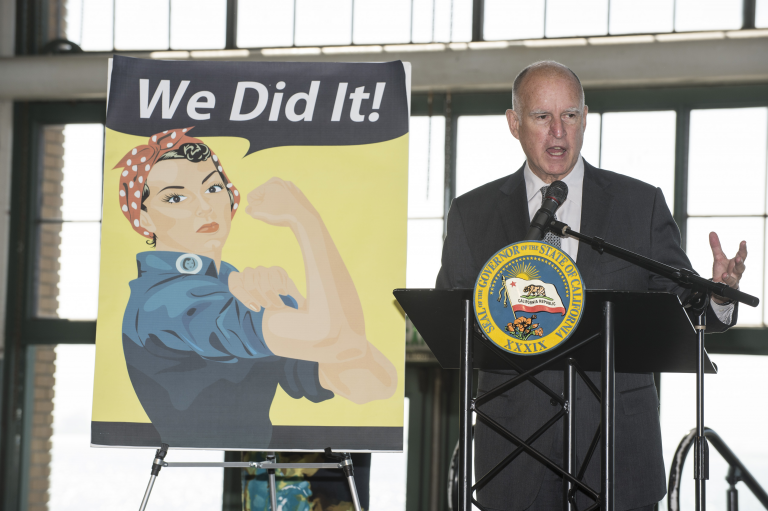-

California workers have yet another reason to rejoice. This month, Governor Brown signed into law a bill that prohibits choice of law and choice of forum provisions in employment contracts.
Why is this law so important?
California has some of the strongest employee protections in the nation. However, some employers have sought to strip away these protections and to deter employees from asserting legal claims through the use of choice of law and choice of forum provisions. These provisions are often buried in arbitration agreements that are presented to employees or job applicants on a “take it or leave it” basis.
A choice of law provision is a term in a contract or agreement that requires that any dispute be governed by the laws of a particular jurisdiction. For example, if a California employee’s employment contract or arbitration agreement has a choice of law provision stating that the contract will be governed by Texas law, Texas law will likely trump California law for claims brought under the contract—even if this reduces or limits the employee’s claims or recovery. Choice of law provisions can make it difficult for employees to even understand their legal rights, as they are likely unfamiliar with the out-of-state laws that would apply to their claims.
A choice of forum provision determines where an employee can assert his or her claim. For example, if there is a choice of forum provision in an employment agreement that requires arbitration in Delaware, that would prevent an employee from being able to file a lawsuit in a California court. Instead, the employee would be forced to pursue their case in arbitration in Delaware. Such a provision serves to deter an employee from bringing forward legal claims because the employee would need to find a lawyer to take on the case in another state, would likely be unfamiliar with the out-of-state forum, would need to travel to the forum, and would have a case that is far more expensive to litigate because the witnesses are not in the same place as the forum.
New Labor Code section 925
This month, Governor brown signed a bill by Senator Bob Wieckowski (D-Fremont)—SB 1241—that creates a new section of the Labor Code:
-

On Tuesday, October 6, Governor Brown signed SB 358 (Jackson), the California Fair Pay Act. The Act, aimed at addressing the gender pay gap, will be the nation’s toughest. It seeks to ensure that women are paid equally for performing substantially similar work, and protects employees from retaliation for disclosing/discussing wages or seeking to enforce their rights. Credit goes to Senator Hannah-Beth Jackson (D-Santa Barbara) for authoring the bill, which had wide bipartisan support, and to co-sponsors
Equal Rights Advocates, California Employment Lawyers Association, and Legal Aid Society-Employment Law Center.The Fair Pay Act Strengthens Existing Law
California’s Equal Pay Act, Labor Code section 1197.5, was first enacted in 1949 and revised in 1985. It is similar to the federal Equal Pay Act of 1963. The Fair Pay Act bolsters the California Equal Pay Act in the following ways:
1. It provides for equal pay for “substantially similar work,” not just equal work in the same establishment.
This means that a woman need not hold the exact job as her male comparators to seek equal pay. Instead, the works needs to be “substantially similar work, when viewed as a composite of skill, effort, and responsibility, and performed under similar working conditions.”
2. It eliminates loopholes and limits employers defenses when a wage differential is challenged.
Previously, the following four defenses were permitted:
-
06 Jan '15

People are almost always surprised to learn that, despite the serious harms that they can cause, workplace bullying and hostile work environments are not illegal unless motivated by discriminatory or retaliatory bias that the law specifically prohibits. The short version: being a jerk to everyone is, well, perfectly legal.Workplace bullying can be devastating. Those who are bullied feel humiliated and demoralized. The bullying can literally make them sick, causing stress and anxiety, depression, sleep disorders, and other illnesses. Employers also suffer as absenteeism increases, morale and productivity decline, and companies lose good employees.
Workplace bullying is also far too prevalent. A national survey conducted by Zogby found that 27% of people have suffered abusive conduct at work and another 21% have witnessed it happen. 7% of those surveyed said they were currently being bullied at work. The consequences of bullying were severe: 48% of those who were bullied said that they left their jobs or felt forced to quit because of the bullying, while 13% were terminated (probably in retaliation for speaking up), and another 13% were transferred to a different position.
-

California just made history as the second state to require paid sick days for employees! On August 30, 2014, Governor Jerry Brown signed into law the Healthy Workplaces, Healthy Families Act of 2014.
Employees will get three days of sick leave (24 hours) per year
Starting July 1, 2015, employees in California who work for 30 or more days within a year will be entitled to paid sick leave. They will accrue paid sick time at a rate of one hour per 30 hours worked, to a maximum of 24 hours or 3 days per year. Employees will be permitted to use the time off beginning on the 90th day of employment.
When can paid sick leave be used?
An employee will be able to use the paid sick time for:
- The employee’s own care – whether for diagnosis, care, or treatment of an existing health condition or for preventive care;
- Care for the employee’s child, parent, spouse, domestic partner, grandparent, grandchild, or sibling – whether for an existing health condition or for preventive care; and
- Certain uses by an employee who is a victim of domestic violence, sexual assault, or stalking.
Logistics of Using Paid Sick Leave
-

Happy tenth birthday to California’s Paid Family Leave Law! Paid Family Leave (PFL) first went into effect ten years ago today on July 1, 2004. For the past decade, most California workers have been entitled to paid leave when they take time off of work to care for a seriously ill parent, spouse, or child. Coverage was also expanded to cover care for a domestic partner. In addition, parents are entitled to paid leave to bond with a new baby during that first year or to connect with an adopted or foster child.
With paid family leave, California workers don’t have to choose between caring for a sick loved one and making ends meet. PFL provides for up to six weeks of wage replacement at about 55% of your pay, up to $1067 per week-through California’s Employment Development Department (EDD).
Today is a special day for PFLL for a second reason: the law, thanks to the passage of SB 770 last year, now provides you with paid leave if you take time off to care for . . . .
-

In California, we are fortunate to have a state minimum wage that is higher than the federal minimum wage of $7.25 an hour. California’s minimum wage applies to nearly all workers in the State, with limited exceptions. On July 1, 2014, California’s minimum wage will increase to $9.00 an hour. It will increase again to $10 an hour on January 1, 2016.
I have written before about how important it is to . . .
-

As corporate profits soar, American workers’ pay keep falling behind. But the movement to increase the minimum wage for American workers has been gaining momentum. In the past year, six states, including California, have raised their minimum wage. Here in California, the minimum wage will go from the current rate of $8 an hour to $9 an hour on July 2, 2014 and to $10 an hour on January 1, 2016. Now, the movement is getting national attention.
-
23 Jan '14

How many times have you heard someone coughing, sneezing, and snotting away at work and wondered why they didn’t just stay home? Did you wince every time they coughed? Were you scared of getting sick yourself? Did you get sick? People come in to work while sick for a number of reasons, but for many it is financial: they simply cannot afford to take an unpaid day off work. That may change soon.
-

2014 will be the year of the whistleblower in California.
Here’s why: On January 1, 2014, new laws (AB 263, SB 496, and SB 666) went into effect that fixed major gaps in Labor Code § 1102.5, the California whistleblower protection law. These are gaps that you probably didn’t even know existed . . . .
-

Reader, you can help bring paid family and medical leave to Americans throughout the country!
Today, Senator Kirsten Gillibrand (D-NY) and Representative Rosa DeLauro (D-CT) will introduce the Family and Medical Insurance Leave Act (“FAMILY Act”). If passed, this bill will provide workers throughout the country with up to 12 weeks of paid family and medical leave.
In a post I wrote for CELA Voice, . . . .
Legislation
Mizrahi Law, APC
- 35 N Lake Ave, Ste 710, Pasadena, California 91101
- dates@mizrahilaw.com
- (626) 380-9000
Client Testimonial
“I highly recommend Ramit Mizrahi. She has a winning combination of knowledge, passion, strategy, and empathy. She takes action and communicates updates promptly. Her professionalism is hard to beat. I’d give her 10 stars if I could!”
Latest News
- Ramit Mizrahi has been recognized as one of the Top 100 Super Lawyers and Top 50 Women Super Lawyers in Southern California in 2023.
- Ms. Mizrahi is being recognized in the 2023 Edition of The Best Lawyers in America©, published by U.S. News & World Report and by Best Lawyers.
- Ms. Mizrahi has been selected as a Top Attorney by Pasadena Magazine for 2023.
- Ms. Mizrahi is serving as Chair of the Pasadena Bar Association Labor and Employment Section.
